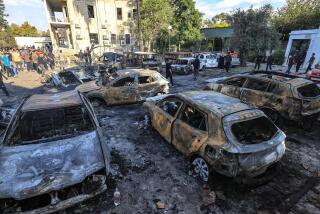COLUMN LEFT : Information Can Stay the Bombs : The media must acquaint America with the context of the dispute, not simply the drama of the desert.
- Share via
The crisis around Iraq is center-stage in the world. Whether or not the feared hot war of bombs, bullets and chemicals breaks out, it will in large measure be determined by another war--the war of information. Information and analysis in the United States will greatly influence the choice of negotiation or confrontation, life or death.
As an American reflecting on my visit to Iraq and Kuwait, I am convinced that the one bridge between that world and this that could serve as a conduit for mutual survival--the American press--has failed to provide the American public with the historical context out of which intelligent conclusions and judgments can be made.
In this age of sound bites, photo opportunities and 30-second clips, a real world crisis is being played as a Hollywood melodrama. The United States and allied forces are against one “evil” man, President Saddam Hussein; one problem, the invasion of Kuwait; one interest, oil.
This cinematic “made-for-TV” analysis is gripping but dangerous. As I stood in the lobby of the Kuwait International Hotel, across the street from the U.S. Embassy, I watched the Iraqi soldiers, business people, civil servants and others gathered around television sets viewing and studying events as they unfolded live on Cable News Network.
This is a totally new phenomenon--international diplomacy by live television. When the President conducts a press conference, it is carried live by CNN and beamed straight into Kuwait and into the government palace in Iraq to President Saddam Hussein.
I watched as the Iraqis watched President Bush fish from his boat off Kennebunkport, discuss his skepticism about any negotiated solution and demand surrender as a precondition for talks. Then the TV showed American soldiers land in Saudi Arabia and perform military exercises in the sand.
These statements and scenes, intended to excite Americans with a sense of will, were inciting fear and preparation for war in Iraq.
An American response to aggression was in order and effective until stability could emerge out of chaos. Now the United States has responded. Now international sanctions are in effect. Now Iraq is faced with a worldwide embargo. Now it is time to seek a peaceful resolution that restores Kuwaiti sovereignty and provides security for Saudi Arabia. No peaceful solution can take place without talks, and for any talks to succeed, the historical context for the dispute must be understood. Bilateral tension between Kuwait and Iraq over land, oil, and boundary lines has existed since the countries were carved up by British colonizers after World War I.
President Hussein has detractors and admirers in the Arab world. There is growing tension between the very wealthy Arab elites and the very poor. Hussein is perceived as championing the cause of the “have not” majority. He is seen as one who has stood up against the United States, which is widely viewed as ignoring the misery of the masses and selectively enforcing United Nations resolutions.
When he speaks of a global economic plan for the Arab poor, financed by the wealthiest countries, it has the same ring of welcome that the Marshall Plan had for Europe after World War II. When he speaks of U.N. resolutions being applied consistently, he speaks even for those who stood against his invasion of Kuwait.
When I met with Saddam Hussein, it was evident to me that he believed that the only reason that he has not been bombed is the presence of United States citizens. His holding them represents his fear. His releasing them to several countries at the same time is his way of sending signals to communicate.
The glimmer of hope in this crisis is that the will to communicate and search for a political solution will come with the same fervor demonstrated in the push for the economic embargo and the military buildup.
A negotiated solution in this situation will be difficult. Aggression cannot be rewarded. Yet historical enmities and injustices can’t be ignored. It is vital that the Administration lend its full support to mediation efforts by the United Nations and by Arab leaders. It is imperative that the news media acquaint the American public with the context of the dispute, not simply the drama of the desert. Properly educated, we may be able to see our way to an alternative to war.
Surely the attempt must be made. We must not, through ignorance and intransigence, make talks and real communications impossible. If we do fail in that, we will make war inevitable.
More to Read
Sign up for Essential California
The most important California stories and recommendations in your inbox every morning.
You may occasionally receive promotional content from the Los Angeles Times.













